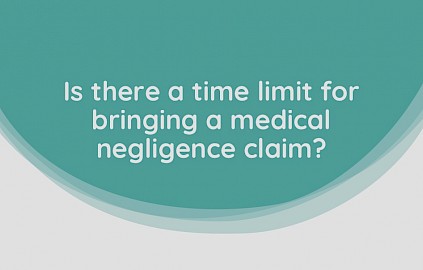Cauda Equina Syndrome Compensation Claims
If you are suffering with cauda equina syndrome due to a delayed diagnosis or delayed surgery, you may be able to make a medical negligence cauda equina claim. Cauda equina can lead to permanent injuries, which can be highly distressing and life-changing in more ways than one. At Medical Solicitors, our expert team is here to help you with your cauda equina claim, supporting you every step of the way to claim the compensation you deserve. Contact us today to discuss your options – we offer free, no-obligation legal advice throughout.
What is a Cauda Equina Claim?
A cauda equina claim will most likely come about where there has been a delay in diagnosis and/or a delay in surgery. Cauda equina syndrome is a medical emergency, and without a quick diagnosis and urgent medical treatment to relieve the pressure, there can be lifelong consequences. For example, a patient may suffer from a foot drop, lose function below the waist, and can even be paralysed below the waist down. The impact on physical and sexual functioning can be very traumatic.
If cauda equina medical negligence can be proven, patients may be able to make a claim for physical disabilities, emotional distress, loss of income, and more.
Do you Have a Cauda Equina Claim?
If your cauda equina has happened because of something that should have been prevented, then you have a medical negligence claim. This will be against the healthcare provider that has let you down.
It is common to hear complaints that patients visited their GP, a chiropractor, osteopath, or the accident and emergency department, only to be turned away. In such cases, crucial opportunities are missed for earlier MRI imaging which can be used to diagnose cauda equina syndrome. In such cases, it can often be shown that earlier scanning would have led to earlier surgery. Earlier surgery can prevent a patient from suffering from permanent disabilities for life.
How is a Cauda Equina Medical Negligence Claim Calculated?
Although the compensation you receive from a successful cauda equina claim cannot give you back your normal physical function, it can compensate you for losing wages, now and into the future. It can also account for any additional help and support you may need immediately and in years to come.
Cauda equina compensation is usually in large sums given the life-changing disabilities that delayed treatment of this condition causes. You can expect to receive anywhere up to around £140,000 for general damages (the value of your injury), on top of any other reasonable financial losses. For detailed information about the value of cauda equina claims, please read our complete cauda equina compensation payouts guide.
How Long do I Have to Make a Cauda Equina Medical Negligence Claim?
You have three years from the date of your negligent medical care or from the date you realised your treatment could have been negligent to begin your claim. As a result, it’s important to begin your cauda equina claim as soon as possible. However, there are exceptions to the medical negligence claim time limit, so please don’t hesitate to get in touch if you have any questions. In some deserving cases, the Courts will allow cases to proceed even though they may be years out of time.

Successful Cauda Equina Claims
At Medical Solicitors, we have a history of success with cauda equina claims. For example, one of our clients received £150,000 in an out of Court settlement. This was to compensate for her cauda equina injuries after delayed diagnosis, along with past and future financial losses.
What is Cauda Equina Syndrome?
Cauda equina syndrome is a rare condition. It describes when a group of nerves at the base of the spine (known as the ‘cauda equina’ – Latin for ‘horse’s tail’) that supply the lower parts of the body, become compressed i.e. squashed. This is usually because of damage to the discs in the spine in the area of the cauda equina. The discs act as shock absorbers in the spine, but when they are damaged and spill out into the cauda equina, that bundle of nerves can become compressed. The cauda equina nerves supply the lower parts of the body, controlling the bowel, bladder, sexual organs and lower limbs.
What Causes Cauda Equina Syndrome?
Cauda equina syndrome can be the result of traumatic accidents or medical conditions, such as:
-
Accident that crushes the spine (e.g. a car accident or fall)
- Penetrating injury (e.g. a knife or gunshot wound)
- Arthritis
- Complications of spinal anaesthesia
- Mass lesion (e.g. a blood clot)
- Complications from cancer
- Side-effect of medications
- Degenerative spinal changes
- A tumour in the lower spinal region
- Infection and/or inflammation of the lower spine
What Injuries can Cauda Equina Syndrome Cause?
Cauda equina syndrome can lead to a number of injuries, including:
- Loss of feelings, or tingling, in the genital area.
- Sexual dysfunction, such as the inability to have an erection.
- Mobility problems, including difficulty walking or dragging feet.
- Weakness and/or loss of sensation or pain down one leg.
- Loss of reflexes and/or function in the ankle and/or toes.
- Severe lower back pain.
- Continence issues affecting the bowel and bladder, including the inability to urinate or to hold in urine or stools.
How Urgent is Cauda Equina Surgery?
Cauda equina surgery must be carried out urgently. These problems can become permanent if surgery is not undertaken quickly enough. There is a period of up to 48 hours to treat the patient. The sooner surgery is done, within that time, the more chance there for better recovery.
If a patient is quickly diagnosed and promptly receives surgery, then a full recovery is possible. However, a delay can lead to permanent disabilities that can have life-changing and financially devastating effects on the patient and their family. A patient may find they can no longer walk normally and have to use a stick or other aids. They may also become permanently incontinent and lose sexual function.
What are the Symptoms of Cauda Equina Syndrome?
There are symptoms that should alert a GP, or other care providers, to be concerned. If so, they should refer you to a hospital for urgent investigation. Cauda equina syndrome can often come on after a patient has been suffering from back pain for some time. A doctor should not assume that new symptoms are part and parcel of a less serious minor health condition. A doctor should be concerned if a patient is complaining of:
- loss of sensation in the genitals
- loss of sensation around the anus
- numb buttocks
- bowel or bladder problems
- loss of sensation in the lower limbs (that can also be accompanied by shooting pains)
- loss of ankle movement
Can Cauda Equina be Misdiagnosed?
Yes, cauda equina syndrome can be misdiagnosed, and this can have devastating consequences. It is often misdiagnosed as sciatica – a relatively common and much less serious condition that often resolves itself in a matter of weeks. Sciatica occurs when the sciatic nerve is compressed, whereas cauda equina syndrome occurs when the cauda equina nerves become compressed. Similar symptoms include pain, tingling and/or numbness in the lower back area, as well as weakness in the legs.
Is Cauda Equina Syndrome a Permanent Disability?
Although cauda equina syndrome itself is not a permanent disability, without urgent treatment, the complications and injuries you can sustain from cauda equina syndrome can certainly result in permanent disability. For example, mobility and continence issues suffered as a result of cauda equina syndrome can be permanent.
Can you Work with Cauda Equina Syndrome?
You may be unable to work if you have suffered permanent injuries. For example, if you now experience mobility issues or permanent bladder issues, this may prevent you from working again. In this case, if you can demonstrate you suffered as a result of cauda equina medical negligence, you would likely be able to make a claim for loss of earnings.
Speak to a Cauda Equina Solicitor Today
If you believe you have a cauda equina medical negligence claim, get in touch with our team as soon as possible. Our friendly cauda equina solicitors have years of experience helping clients to succeed with their claims.
Contact us for an informal, informative chat about your potential cauda equina claim and we’ll provide you with free, no-obligation legal advice on how to best proceed. If we believe we can assist you, we will most likely offer you a No Win, No Fee Agreement (also known as a Conditional Fee Agreement). This means you have nothing to lose financially in contacting us.
Even if we cannot assist you with a cauda equina claim, our helpful team always thinks ‘outside the box’ and will always try to recommend other services that may be helpful to you (such as social services and benefits advice).
We understand how difficult it must be to adjust to a new life as a result of cauda equina syndrome injuries. Rest assured that there are places you can turn to for support, whether you want to discuss your mental health, seek financial advice, or connect with others who have endured a similar experience. For this information, please read our cauda equina syndrome support guide.












